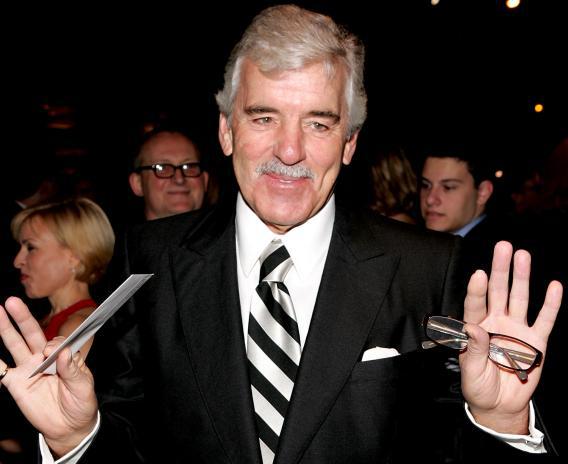The last time I saw Dennis Farina, he was standing in his underwear in the middle of the street. Farina, the cop-turned-actor whose credits include everything from Midnight’s Run to Snatch, died today at the age of 69. His first credit came in 1981, and his last in a recent episode of New Girl, in which he played Nick’s slick, charming, con-man father, who, hoping to patch things up with his boy, decided to drop trow—and make everyone laugh in the process.
Farina played everything with an insuppressible inner sparkle, a little hint of hip-to-the-absurdity-of-any-situation self-awareness. Whether in New Girl, hiring his teenage son a prostitute, or on Luck, buffing his underworld boss’ shoes while teasing him, Farina’s characters were both no-nonsense and affectionate, likeable no matter their misdeeds.
Farina could handle the serious stuff, but he delivered it lightly. Even when he was playing threatening, he was fun to watch, blessed with a comic actor’s timing—which is part of what made him such an excellent curser: He delivered each dirty word like it was a punchline. When he showed up you were in for a good time. It’s sad there won’t be more.
— Willa Paskin
***
Dennis Farina switched off among a very narrow set of roles—the whiskered detective, the whiskered goon, the whiskered police captain, the whiskered consiglieri—but all those hours spent in gruff, hard-boiled mode gave him a mastery of his craft.
What a craftsman! He didn’t have the best materials: Never less than stiff, never more than wooden, Farina hardly seemed the type for Hollywood. He got his first role—as an afro-wearing, gun-toting henchman in the 1981 film Thief—from Michael Mann while still an employee of the Chicago Police Department. Farina started doing local theater after that, acting in his free time, and hanging out with John Malkovich, and by 1986, he’d quit the force. Mann fought hard with studio execs to give him the lead role in his ambitious TV drama Crime Story, based on the life story of Farina’s former boss, Chuck Adamson. He tried to explain Farina’s charm to a reporter for the Miami Herald: “It’s a mystery to me because I know him so well and I think he’s so fucking ugly … When we had these casting meetings, a couple of guys would say, ‘Well, I don’t know if he’s good-looking enough,’ and there would be some women there and they’d say, ‘Are you kidding?!’ To tell you the truth, I think women sense his gentleness. He’s a real gentle guy.”
Though he may be better-known these days as Det. Joe Fontana from the cast of Law & Order, he might better be remembered as the quintessential Mann’s man: An ugly-sexy actor who walked the line between high style and authenticity. (Farina appeared in several other Michael Mann productions: Manhunter, Miami Vice, Luck, and a long-forgotten TV movie called Drug Wars: The Cocaine Cartel.) That’s where Farina was at his best: He could always carry off a gritty, pretty version of himself.
— Daniel Engber
***
As the only person under the age of 85 who has probably seen every episode of Unsolved Mysteries, I can say with more authority than dignity that Dennis Farina was, among his many other accomplishments, the best host that show ever had. I didn’t feel that way when Lifetime first hauled the show out of mothballs back in 2008. I joked at the time that Farina had to agree to hosting duties as a condition of his probation for an airport gun charge. And after a lifetime of listening to Robert Stack’s glowering variations on “and she was never seen again,” Farina took some getting used to.
Farina didn’t take it very seriously, for one thing. A smirk seemed to lurk beneath the no-nonsense brush-stache—a curl of contempt for the recycled-from-the-’80s footage he had to introduce, or the fiction that, if Bigfoot did exist, the UM call center was just the outfit to apprehend the creature at last. I felt protective of the goofy syndicated catch-all, which married Time-Life’s Mysteries of the Unknown book series and the sticky, crookedly-printed true-crime tabs from back in the day, then put the scenery-gnawing offspring on TV and hoped someone in the audience had met D.B. Cooper or photographed a werewolf. And with the 2008 iteration, I hoped that, in the age of Internet everywhere, more of the mysteries would get solved. But Farina sometimes laughed at it, quietly, inside his mustache.
But as time went on and I kept watching—recording episodes buried in the dead of night with witchy start times like 2:34 a.m.—Farina’s “get a load of this” tone grew on me. Farina half-assed a good portion of his framing remarks—during one reunion of twins separated at birth, I could swear he checked his watch—but when he did get serious, I knew I should too. Farina had been a cop, Farina had played dozens of cops, and Farina, I could assume, knew what was up. When he bore down, knitted his brows, got a little dusty talking about a vanished child, shit got real.
I loved Robert Stack and the man was a pro, but he never varied the intensity of his somberness; he wore an Untouchables trenchcoat, to protect him from the deep chill of ignorance, and he took the show entire so seriously that, as a result, even the truly unsettling segments became laughable, something you didn’t admit to watching. (On our first date, my husband, an actor, told me he’d appeared on an episode as “Detective No. 2” back in the ’80s. When I shrieked with glee and peppered him with questions, he assumed I was mocking him.)
By nodding eeeever so slightly to the silly parts of Unsolved Mysteries, Dennis Farina made it seem less silly overall—another tough job he made look easy. Well done, sir.
— Sarah D. Bunting
